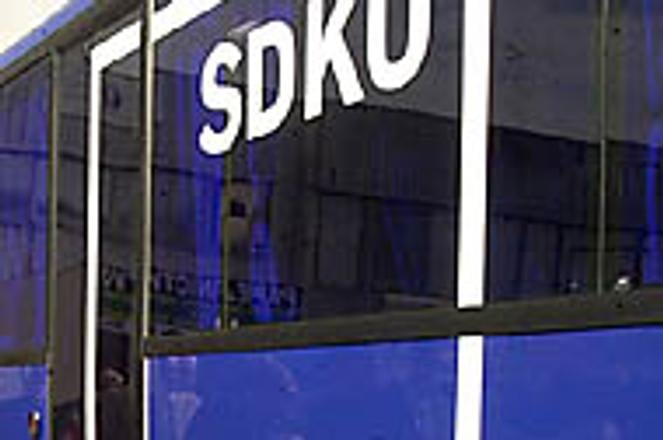The SDKÚ party of Prime Minister Mikuláš Dzurinda has chosen this blue bus from which to conduct "meetings with citizens".photo: TASR
Parliamentary elections may be over a year away, but Slovakia's political parties have already launched an unofficial pre-election campaign that has seen government and opposition leaders criss-crossing the country and scoring prominent media appearances.
Vladimír Mečiar, head of the opposition Movement for a Democratic Slovakia (HZDS) party, has been featured ever more regularly on public stations STV and SRo radio. Mention of his name jumped from 359 Slovak media reports in April 2001 to 465 in May and 561 in June, according to the Slovakia Online media search engine. Mečiar's party has topped the polls since narrowly winning September 1998 elections, but being unable to form a government.
Meanwhile, Pavol Rusko, head of the non-parliamentary ANO party, which was formed in April, has used his powerful Markíza TV station to abet his fortunes. Markíza, which is watched at least once a day by over 70% of Slovaks who can receive the station, has regularly carried spots featuring senior ANO officials. According to independent media monitoring agency MEMO 98, Markíza from April to May this year gave ANO over twice as much airtime as the party received on the country's other two national stations combined.
MP Róbert Fico, chairman of the non-parliamentary Smer party, even took a month's leave of absence in June - unpaid and unsanctioned by parliament - to meet with voters.
But it wasn't until last weekend that a government party met the challenge.
The SDKÚ party of Prime Minister Mikuláš Dzurinda, fronted by four senior party functionaries, on June 30 launched the voyage of its 'Blue Bus' around Slovakia from the capital Bratislava. "It has in front of it 45 days, 4,500 kilometres and 200 stops," read an official SDKÚ press release. "We want to use the summer for honest talks with people, without neckties and without officialdom."
Avoiding confrontation
For Dzurinda, the Blue Bus is a marked departure from the bicycle he used to tour Slovakia and whip up support during the 1998 pre-election campaign. But while the PM still admits "I bicycled myself into my job", today he has chosen what his party staff call a 'less emotional' appeal to voters. Dzurinda's 1998 promises of doubled salaries and punishment for privatisation criminals, for example, have been replaced by more sober vows to secure EU and NATO integration, as well as to slash corporate tax from its current 29% to 18% by 2005-2006.
The Blue Bus campaign, in turn, promises to "increase the level of information about the advantages of Slovakia's membership in the EU and NATO."
Zuzana Martináková, a former journalist with the Slovak section of BBC radio and now vice-chairman of the SDKÚ, said that the shift from emotional to pragmatic themes was a reflection of how much Slovak society had matured since 1998. "It is evidence of progress in the mindset of society, because emotional promises are the sign of a crisis situation," she said, referring to the tense 1998 pre-election atmosphere in Slovakia.
"In a country like this, it's nothing but good when an election campaign is all about the level of taxes," Martináková added, while admitting the SDKÚ wanted to avoid topics such as prosecution of former privatisers or unemployment - issues on which the party had a poor record.
However, political professionals warned against turning topics such as integration into western alliances into political cannon fodder - no matter how staid they might seem.
"Even such issues as this one [NATO integration] can be emotional and even confrontational, depending on how they are presented to voters," said Grigorij Mesežnikov, president of the IVO think tank in Bratislava.
"Party politics should be taken out of NATO integration," agreed Mesežnikov's IVO colleague, sociologist Oľga Gyárfašová. "It shouldn't be presented as something that is in the interests of the SDKÚ, or against the interests of the [nationalist and pro-neutral] Slovak National Party [SNS]."
What campaign
Appearances to the contrary - its press release declares "we will explain our policies" to voters at whistle stops - the SDKÚ denies its Blue Bus is a pre-election strategem. "How could it be a pre-election campaign, when according to the law such campaigns cannot begin until a month before elections?" asked SDKÚ Treasurer Gabriel Palacka.
Palacka termed the party's summer bus tour as "meetings with citizens".
Other parties, meanwhile, made no bones about their intentions.
"Our leaders have been meeting with people across Slovakia for over a month, and I can tell you openly that yes, this has been an unofficial pre-election campaign," said Fedor Flašík, head of Smer's election team. "We were just following the lead of most parties, including the SDKÚ, in starting an aggressive campaign."
Flašík added that Smer leaders had favoured unofficial contacts with voters "to find out what really [angers] them," findings that would later become the basis of the party's official vote campaign.
Smer officials in June travelled Slovakia by car and during public meetings used a giant screen on which they projected 'political theatre'. While Fico, who in polls has emerged as the most trusted politician in the country, has often been branded a populist, his recent campaign has been waged under the slogan "No Promises".
In discussions with voters, Smer members focused on the party's four priorities - agriculture, manufacturing, education and the fight against criminality. For every question a voter put that didn't receive an answer, the asker received a bottle of champagne.
Tibor Šimoni, the coordinator of the SDKÚ's Blue Bus tour, said the party had chosen the vehicle as a "suitable means of transportation for communicating with people," adding that the blue colour matched that of the SDKÚ logo.
Neither he nor SDKÚ Treasurer Palacka could say how much the party was paying to rent the bus, or which firm had made the vehicle available to the party.


